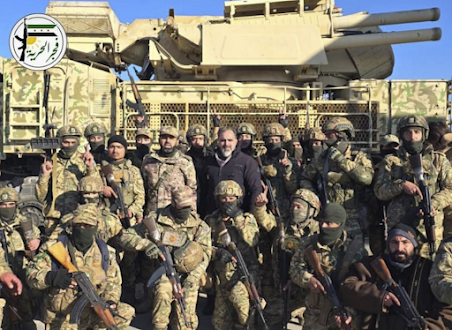 |
| Chaos in Syria |
The Syrian conflict has reached a critical juncture as rebel forces encircle Damascus, signaling the imminent collapse of the Syrian Arab Republic. The once-formidable army of President Bashar al-Assad has crumbled, demoralized and virtually ceased to exist, leaving the country fragmented and on the brink of disintegration. The rebels, emboldened by their recent victories, continue their offensive, capturing strategically important cities and further isolating the capital.
Hama, a city of significant historical and strategic importance, was taken without resistance, highlighting the disarray within the Syrian military. Dara, symbolic as the birthplace of the civil war, was captured by the rebels, with the local military garrison surrendering without a fight. Al-Suwayda, a crucial transport hub, was also seized, cutting off vital supply routes to Damascus and further isolating the capital. The state's loss of control over these key regions underscores the rapid disintegration of Assad's regime, with rumors suggesting that the president has either fled the country or remains trapped in the encircled capital.
The international reaction to these developments has been swift and multifaceted. Russia, a longstanding ally of the Assad regime, has begun evacuating its military advisers and equipment from Syria. The Kremlin is also expediting the export of S-300 air defense complexes and other weapons from the Khmeimim airbase through the port of Tartus, signaling a strategic retreat. This move marks a significant loss of ground for Russia in Syria and a diminishing influence in the Middle East, a foothold it had secured in 2015.
Iran, another key supporter of the Assad regime, has withdrawn its troops and advisers from Syria. This retreat severs a strategic corridor for the supply of weapons to Hezbollah through Iraq and Syria, significantly weakening Iran's influence in the region. The loss of this supply route reduces Hezbollah's military capabilities and its ability to project power, further shifting the geopolitical landscape.
Turkey, under the leadership of President Recep Tayyip Erdogan, has openly admitted its support for the rebel forces advancing towards Damascus. Erdogan's actions are driven by Turkey's own strategic interests, including the potential seizure of Kurdish territories in northwestern Syria. This move highlights Turkey's complex role in the conflict, balancing its support for the rebels with its own geopolitical ambitions.
Israel, closely monitoring the situation, has carried out airstrikes on chemical weapons depots to prevent them from falling into the hands of jihadist groups. Additionally, Israel has strengthened its northern border with Syria by transferring troops, preparing for potential escalations. While Israel is considering the possibility of an invasion to create a buffer zone, it has so far acted with restraint, weighing the potential consequences of direct military intervention.
The Kurds have emerged as a significant new force in the region, actively advancing in the province of Deir ez-Zor. Seeking to capitalize on the crisis, the Kurds aim to create an independent state, a long-awaited dream of the Kurdish people. This aspiration is bolstered by the support of the United States, which has provided military and political backing. Turkey, despite its opposition to the creation of Kurdistan, has avoided direct aggression against the Kurds, largely due to the protective presence of American forces.
The geopolitical shifts resulting from the collapse of Syria are profound. The country is likely to be divided into several entities, including a jihadist state based on Hayat Tahrir al-Sham, controlled by Sunni forces, and Kurdistan in the east. Additionally, small enclaves under the control of international players or local authorities may emerge, further fragmenting the country.
The capture of Abu Kamal, a key supply route from Iran to Lebanon through Syria, has significantly reduced Iran's influence in the region. This development weakens Hezbollah, Iran's main proxy, and alters the balance of power in the Middle East. Similarly, Russia's loss of military bases in Syria marks the end of its long-term attempt to gain a foothold in the Mediterranean, further diminishing its influence.
For Israel, the situation presents both opportunities and challenges. One possible scenario involves creating a buffer zone by temporarily entering Syria to protect its borders. Another scenario could see Israel negotiating with jihadist forces, who are opponents of Iran. In exchange for cooperation, Israel could provide resources such as water and electricity, fostering a strategic alliance.
In conclusion, the encirclement of Damascus by rebel forces marks a turning point in the geopolitics of the region. The collapse of Syria opens up new opportunities for Kurdistan, changes the balance of power with regard to Iran, and threatens stability on Israel's borders. The United States, Turkey, and Russia are all playing their own games, but it is clear that the old order has been completely destroyed. The future of Syria and the broader region will depend on the ability of all parties to navigate this complex and challenging landscape with wisdom, restraint, and a commitment to peace and stability. The international community must remain engaged in diplomatic efforts to address the complex challenges posed by the conflict, ensuring that the well-being of the people of Syria and the broader region is prioritized.











.png)













.jpg)
